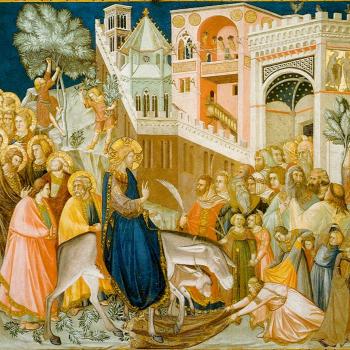There is nothing harder than having to preach from a scripture text most everyone knows and most everyone misinterprets. Isaiah 7 is the beloved passage mentioned in Matthew's gospel regarding the birth of Christ: "The young woman will bear a child and will call him Immanuel." Ask any biblical scholar, however, and they are quick to tell you that this probably has nothing to do with Jesus (directly) at all, and that there are some things going on in the back story that make it a little less fuzzy around the edges. (Read John Holbert's excellent post on this passage for more information.) What we are left with is a story about a king who wants to align himself with a powerful nation, and a prophet who is trying to persuade him to align his hopes with God instead.
As we gathered around the table this week to discuss this passage, we talked briefly about these political points, and Isaiah's declaration that God is the only power any person or nation needs. There is certainly enough relevance in these points for a good Sunday's conversation, but we found ourselves drawn to the question of signs. It's rather remarkable that Ahaz was offered such an open, unhindered invitation to ask God for a sign. We are usually supposed to be the people who don't need signs, because we've got one better—a covenant. But there are few among us who wouldn't jump at the chance to get one, if we could. Who doesn't want a little help in shushing that nagging voice of doubt and suspicion in our heads?! That's why it's even more remarkable that Ahaz didn't want a sign and rejected the offer. What is he, crazy?!
Well, maybe not. Think about what would happen if you were to receive a sign. You have this question, this serious crossroads staring you in the face, and you say you want to know with certainty what to do. And that is partly true. But there is a small part of you that is also terrified of knowing the answer, because what if it means that you have to do something you don't feel ready to do, or that you simply don't want to do? Once you have a sign, you have officially run out of excuses. You now know what to do, and you have to do it.
For Ahaz, this meant rejecting an offer to align himself and his kingdom with the powerful winning team of Assyria. And Ahaz loved to be on the winning team. If Isaiah was telling him to ask God for a sign—any sign—that would keep him from making a deal with Assyria, Ahaz must know that this sign would force him into a position of vulnerability and trust and the unknown future. He felt far safer in the hands of his enemies.
Sometimes, so do we. We have grown to like our enemies of fear and doubt and anxiety. We are afraid to get rid of them, like the most ridiculous adult security blankets there ever were. But Isaiah comes to Ahaz, and to us, and says to get ready, because God is going to give us a sign anyway. A young woman will bear a son, and his name will be Immanuel, God with us. He will show us the way of eternal life, of eternal living, rejecting the evil and choosing the good. And our well-built mound of excuses will become meaningless. We have seen the way. We know what it looks like. We have run out of excuses. It's time to start walking.
Check back every other Tuesday for the latest from Preaching in Community, a new featured column at the Patheos Preachers Portal.
12/21/2010 5:00:00 AM





